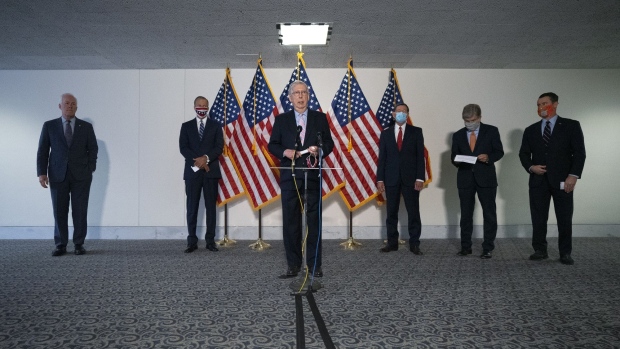Jul 29, 2020
GOP Fiscal Hawks Rediscover Their Voice in New Stimulus Fight
, Bloomberg News

(Bloomberg) -- Republican fiscal conservatives are reasserting themselves in the debate over another stimulus bill, attempting to put the brakes on new spending after their party presided over tax cuts and spending that have swelled the federal deficit.
The renewed concern about deficits and debt comes a few months after the House and Senate approved with overwhelming bipartisan votes the biggest economic stimulus package in history, and as Congress wrangles a follow-on measure with the economy staggered by another surge of coronavirus cases and deaths.
Senate Majority Leader Mitch McConnell nodded to deficit concerns on his right by declaring a pause on more stimulus after the $2.2 trillion relief plan passed in March. Now he and congressional Republicans face a mad dash to partially restore unemployment checks and other relief that is already running dry with less than 100 days before the election that will decide control of the White House and Congress.
McConnell unveiled the $1 trillion Republican plan on Monday and has largely left negotiations with House Speaker Nancy Pelosi and Democrats to Treasury Secretary Steven Mnuchin and White House Chief of Staff Mark Meadows. With only two weeks before lawmakers are scheduled to leave for an August break and portions of the previous stimulus expiring, Congress is on a tight timetable to reach a deal. Progress has been slow.
“I don’t know that I would characterize it as getting closer,” Meadows said after leaving Tuesday’s negotiating session with Pelosi and Senate Democratic leader Chuck Schumer.
While the two administration officials engage with Democrats, McConnell has touted the smaller price tag of the Republican package relative to the $3.5 trillion Democratic proposal as a sign of fiscal prudence. That hasn’t sold it to a sizable number of Republicans in the Senate.
“There is significant resistance to yet another trillion dollars,” Texas Senator Ted Cruz, who’s been among the most vocal critics, told reporters this week. “The answer to these challenges will not simply be shoveling cash out of Washington.”
The federal debt has swelled a staggering $6.6 trillion since President Donald Trump took office in 2017 after he signed a major GOP tax cut and went along with a series of spending hikes. The Congressional Budget Office already forecasts the deficit will hit a record $3.7 trillion in the federal fiscal year ending Sept. 30, and with another round of relief could easily pass $5 trillion.
Currency Warning
The cycle of spending and debt, along with the faltering economy, is creating jitters on Wall Street. Goldman Sachs Group Inc. on Tuesday issued a dire warning that U.S. policy is triggering currency “debasement fears” that could end the dollar’s status as the world’s reserve currency.
The revival of deficit complaints from lawmakers like Cruz and Ron Johnson of Wisconsin arguably couldn’t be coming at a worse time for the GOP.
Trump’s approval rating has dropped and independent election analysts are now giving better odds of Democrats taking the Senate and expanding their control of the House in the November election. Now Republicans are proposing to trim aid that was in the last stimulus for tens of millions Americans who have lost their jobs amid a recession despite warnings from economists that the country needs another fiscal jolt.
“The proposed $1 trillion outline is the bare minimum if all goes peachy in the economy and markets through to the new Congress in 2021,” said Derek Holt, an economist at Scotiabank.
But it does set up a return to the GOP’s fallback position as “the party of no” should Democrat Joe Biden, who has surged in the polls against Trump, win in November. That could position Republicans like Cruz, who was the runner-up to Trump in the GOP nomination race four years ago, for 2024 presidential campaigns based on fiscal discipline.
Other potential future presidential candidates have also been banging the deficit drum, including Senator Rick Scott of Florida. He has railed against the idea using debt to shore up state and local governments reeling from lost revenue from the pandemic. Scott has contended states like his shouldn’t have to subsidize states like New York.
And Republican Senator Ben Sasse of Nebraska torched both the White House and Democrats for proposals to add to the red ink.
“The White House is trying to solve bad polling by agreeing to indefensibly bad debt,” he said. “This proposal is not targeted to fix precise problems — it’s about Democrats and Trumpers competing to outspend each other.”
Senator Mitt Romney of Utah, the party’s 2012 presidential nominee, has inserted a plan for bipartisan committees to propose long-term fixes to entitlement programs and the Highway Trust Fund early next year — a clear signal of where the party’s agenda would go should Biden win in November and of the party’s own failures to tackle deficit issues under Trump.
An exception to surge of deficit scolding is Senator Marco Rubio of Florida, who has taken a lead role in perhaps the most visible and expensive part of the GOP’s stimulus responses to date — the Paycheck Protection Program of forgivable loans for small businesses. Rubio this week warned of economic catastrophe unless Congress acts again and proposed sending another tranche of aid to smaller businesses that have seen a 50% cut in their revenue in a quarter.
McConnell said GOP leaders did their best to craft a package that the broadest group of Republicans could support, but acknowledged his party is divided.
“It’s a statement of the obvious that I have members who are all over the lot on this,” McConnell said. “There are some members who think we’ve already done enough, other members who think we need to do more. This is a complicated problem.”
©2020 Bloomberg L.P.






